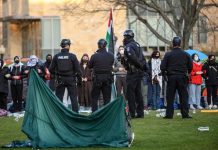Pakistan has suspended mobile calls and data services as millions head to the polls to vote in a new government.
Many analysts call this Pakistan’s least credible election yet.
Both calls and data services have been suspended, though Wifi networks still appear to be working.
One voter told the BBC they were shocked at the decision, saying „voters should be facilitated instead of [having to be met with] such hurdles”.
Another said she was expecting a blanket shut down.
Many voters in the city of Lahore told the BBC that the internet blackout meant it was not possible to book taxis to go and vote, while others said they couldn’t chat to other family members to co-ordinate when to head to polling stations.
Justifying the move, an Interior Ministry spokesman said, „As a result of the recent incidents of terrorism in the country, precious lives have been lost. Security measures are essential to maintain law and order situation and to deal with potential threats”.
This comes as two bomb blasts killed 28 people in the restive Balochistan province on Wednesday. The country is on high alert, with heavy security presence at polling stations across the country.
Border crossings with Afghanistan and Iran have been closed for both cargo and pedestrians to „ensure full security” during polling, a spokesman from Pakistan’s foreign ministry said.
Strict rules around election coverage – including what can be said about candidates, campaigning and opinion polls – remain in place until the end of voting at 1700 local time (1200 GMT).
The country has in the past shut down the internet to control the flow of information – though a shutdown of this extent is unprecedented, especially during an election.
Outside one polling station in the city of Multan in Punjab, some female polling agents told the BBC they were not allowed to enter polling booths – and therefore could not observe the polling process.
Typically, female polling agents are given a seat inside booths.
In Lahore, dozens of voters crammed into the small corridors of a school in Naseerabad, with some saying they had been waiting for more than two hours to vote.
As many as 128 million people are registered to cast their votes, almost half of whom are under the age of 35. More than 5,000 candidates – of whom just 313 are women – are contesting the 336 seats up for grans in this election.
The Pakistan Muslim League (Nawaz) (PML-N) and the PPP are considered the two major parties going into the vote.
However, picking out candidates from Khan’s Pakistan Tehreek-e-Insaf (PTI) party is more difficult, after it was banned from using the cricket bat symbol under which all its candidates run.
The move has forced PTI-backed candidates, who are running as independents, to use other symbols instead, including calculators, electric heaters and dice. Electoral symbols play a key role in a country where more than 40% are unable to read.
The PTI allege other tactics have also been used to prevent their candidates from winning seats, including locking up PTI members and supporters and banning them from holding rallies, effectively forcing them underground.
Millions have been hit hard by the country’s economic woes, which were exacerbated by devastating floods in 2022. Inflation is soaring, and people are struggling to pay their bills.
On Wednesday – less than 24 hours before the first voters cast their ballots – two separate attacks on candidates’ offices left more than 28 people dead in Balochistan province.
The Election Commission of Pakistan has categorised half of the 90,675 polling stations as either „sensitive”, meaning there is a risk of violence, or „most sensitive”, indicating a higher risk. The classifications are based on the region’s security situation and history of electoral violence.

















